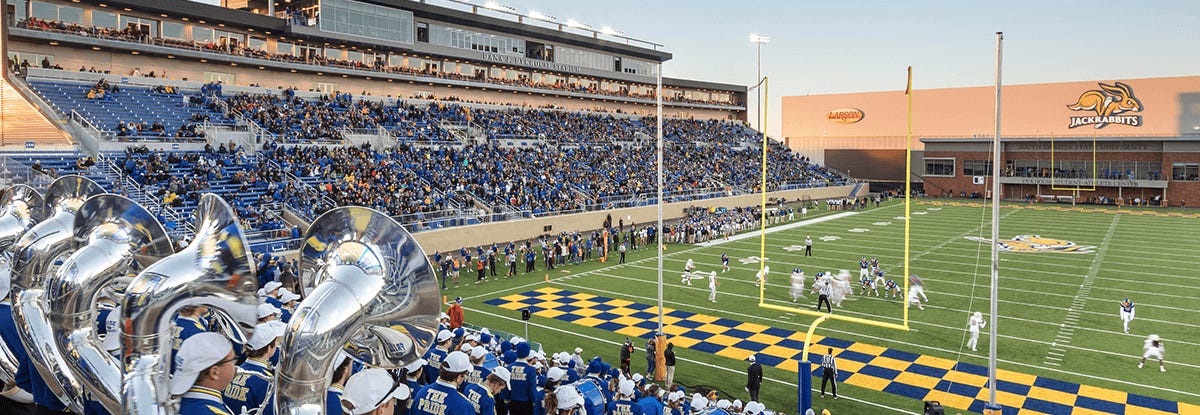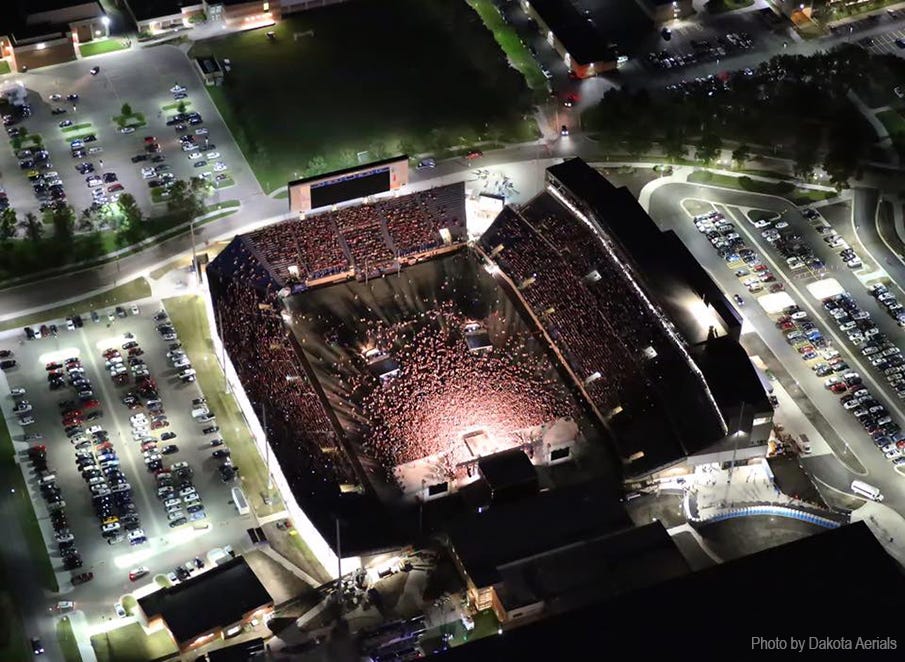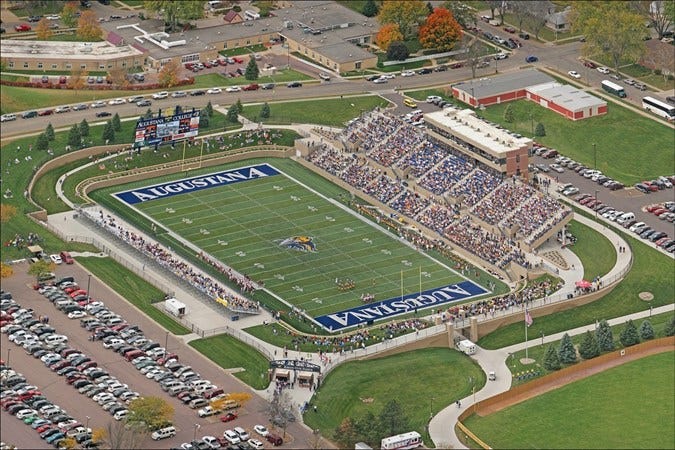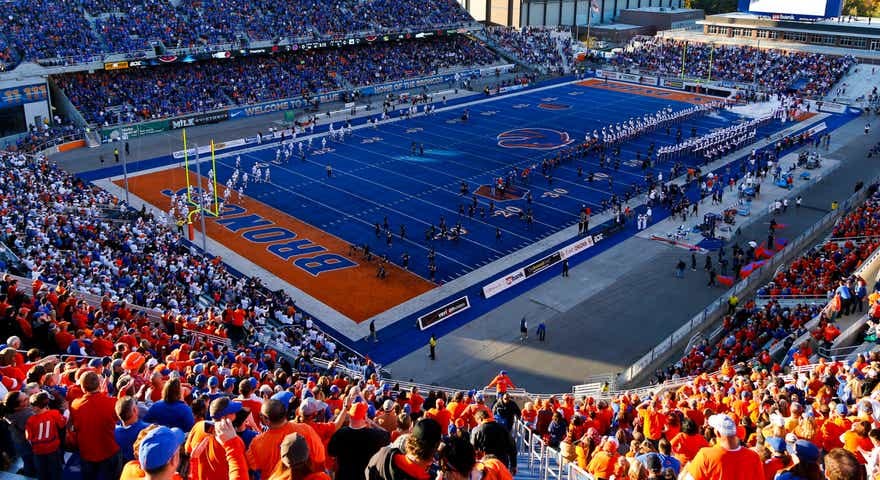SDSU students lobby for GA alcohol sales at home games
Proponents say allowing beer, wine sales could boost attendance, revenue
BROOKINGS – During December’s Board of Regent’s meeting held on the South Dakota State University campus, two SDSU students, Jonathon Sundet and Brandon Frizzell, spoke to the board about a conversation that has been taking place among SDSU fans, students and alumni alike: Why isn’t beer sold at home games?
South Dakota Codified Law 35-2-6.1 restricts the sale of alcoholic beverages at regental universities with exceptions for “periodic retail sale of malt beverages or wine for consumption on-site at a location and time, authorized by the BOR, that involves the performing arts, intercollegiate athletics, fundraising, a reception, a conference, or an occasional or scheduled event at a facility used for performing arts, intercollegiate athletics, events, or receptions.”
The South Dakota BOR’s policy 6:14 further restricts alcoholic beverages at athletic events by only allowing alcohol sales in “box suite and lounge areas.”
In 2016, SDSU began selling beer and wine at home football games; however, purchasing power was restricted to those who were sitting in premium seats (luxury box, loge). Those who sit in general admission (GA) (the large majority of fans) are unable to purchase beer or wine at home games.
“As a land grant university, we talk about equal opportunity, equal access all the time. It’s not equal access and opportunity. If you have connections and have a lot money, you can drink alcohol,” Sundet said in an interview with the Register. “But if you’re (for example) a rancher or a farmer going to an SDSU game, you can’t be treated like an adult (and have a beer). How much money do you have to pay to prove you can drink?”
Sundet, a Brookings native and current SDSU sophomore, has long enjoyed attending SDSU football and basketball games, but he noticed in college that once students turn 21, they often will skip out on attending the actual game, choosing to go downtown to watch instead.
“There’s even alumni who don’t go,” Sundet said. “They’ll go to Cubby’s or Buffalo Wild Wings instead. I love going to the games and being able to scream and get involved in the game. It adds to the excitement and the more people there, the better.”
Sundet, who is a senator with SDSU’s Student Association, was approached by Frizzell, who is a member of SDSU’s Rabbit Den (student section for the Jacks), about possibly moving toward a resolution to allow alcohol at home games. Initially, Sundet was opposed to the idea and “didn’t want this within a 10-foot pool of me.” But after gathering more information, he found this “to be a great idea” and became in support of the move.
The first step in the process was to gather signatures from every regental student university president in the state to support a change in the regent’s alcohol policy. After gathering signatures, a letter, which voiced the collective student association’s opinion on changing policy 6:14, was sent to BOR Executive Director Brian Maher.
Every school’s student association in the state, other than the University of South Dakota and Black Hills State University, has also passed a resolution in favor of changing policy 6:14. USD and BHSU have voiced their support on the policy change but are waiting until the next semester to vote, Sundet says.
This fall, when the student association voted on a resolution to change policy 6:14, Sundet said a number of students came in support of the move.
“Students are definitely for it,” Sundet said. “I have not heard any negative feedback on changing the policy.”
Fan experience
“We have a very good football team, obviously,” Sundet said. “But at the same time, the product on the field can be extremely good, but what matters (for fans) is the atmosphere and the experience.”
The ability to watch SDSU football is much different than it was in the ’90s or even mid-2000s. No longer is in-person attendance required for watching games. Every SDSU game is now televised (or streamed) on ESPN+, which costs roughly $7 a month, much cheaper than any ticket at the stadium. During the BOR presentation, Frizzell said that fan experience is the driving factor in bringing people to the game.
“When we talk about ticket sales, it’s not about the product on the field. It’s the product and the atmosphere that drives people to buy tickets for a football game,” Frizzell said.
In 2015, the last year of Coughlin-Alumni Stadium, SDSU averaged 12,899 fans of the course of the regular season. That number ranked them 16th nationally among FCS schools. The following year, the first year in the new Dana J. Dykhouse Stadium, SDSU averaged 15,019 fans, one of the highest attendance years in SDSU history, which ranked them 15th nationally. Up until this year, attendance numbers had been on a gradual decline. This year however, attendance numbers rebounded, as SDSU averaged 14,166 during the regular season, an increase from 2019’s 12,724, according to SDSU football statistics.
Sundet believes that alcohol sales in GA seating could help attendance numbers.
“This policy change would just invite more people who would rather go get a drink and watch the game while creating a safer gameday environment where the police can control it,” Sundet said.
Sundet points to the fact that SDSU has previously sold alcohol in GA seating during both Jacks Bash events.
“There were limited instances (of drunken behavior) at (both Jacks Bash events), and I talked to our university police department and they said that were able to control it,” Sundet said. “That’s an environment that’s more wild and larger than any athletic event. If they can handle that, they should definitely be able to handle football games.”
A misconception that some have, according to Sundet, is that some believe with GA alcohol sales, it will create a negative, drunken environment for other fans in the stadium. Sundet, through his research, has found that to not be the case when other schools added initially alcohol sales.
“Other schools that have had this policy change have seen a reduction in binge drinking and alcohol-related instances,” Sundet said. “That’s what our focus was – while alcohol sales are allowed, it does create a better environment for drinking and non-drinking fans alike.”
Sundet pointed to a statistic given out by the police chief at West Virginia University, who said that in 2011, when in-stadium beer sales were implemented at WVU home games, the number of gameday arrests that year was 79, a substantial decrease from the 117 arrests the year before.
During the presentation, Frizzell noted that people at the games would be “less intoxicated as well because not all drinking would be to stay drunk for four hours (the entirety of the game) when they know they can get one at halftime.”
“I wouldn’t say it’s a problem but when people are moving from the tailgate to the stadium. People are drinking and when it’s time to go to the stadium, maybe they’ll have a few cans left and they’ll feel the need to down it,” Sundet said. “They do, and that’s some of the problems that they have seen where some people are passed out in the bathroom or some people are just overly intoxicated. That would cut down significantly if people were just allowed to have one or two beers in the stadium.”
Sundet said he has gathered this information through research and conversations with UPD. He says that his conversations with UPD have enlightened him on the issues with binge drinking between the end of tailgate and the start of the game.
If the BOR were to change policy 6:14, football would not be the only sport that could be serving beer at home games. According to Sundet, adding alcohol sales to Frost Arena has also been discussed.
Other schools
This year, Augustana University became the first school in South Dakota to offer beer and wine to all fans of legal age. In 2019, Augustana tested the waters with a one-game trial for a beer garden inside Kirkeby-Over Stadium. The beer garden was well received, which resulted in Augie implementing a full-time beer garden for the 2021 season.
“The new season-long fan amenity will be guided by a policy designed to promote responsible consumption and a safe and enjoyable environment for all fans,” an August press release from Augustana athletics said.
As a private university, Augustana is not subject to South Dakota BOR policies.
Augustana’s beer garden policy restricts where patrons can enjoy adult beverages. No one with a beer is allowed to leave the designated beer garden area. Those in the garden can still observe the game via an observation area but cannot return to their seats with an alcoholic beverage. The garden closes at the conclusion of the third quarter, and each person is allowed to purchase a maximum of two beers at any one time.
Across the Missouri Valley Football Conference (MVFC), 10 of the 11 schools allow for alcohol sales inside the stadium. North Dakota State University, which plays at the City of Fargo-owned Fargo Dome, does not allow any beer, liquor or wine to be sold during home games. NDSU does allow for beer and wine sales at home basketball games. At the University of North Dakota, beer and wine is available in general admission seating at both football and hockey home games.
USD takes the same basic approach SDSU does by restricting sales to those who are in premium seating. The rest of the MVFC allows for general admission fans to purchase alcohol.
While most universities have previously been hesitant to allow for beer sales inside stadiums, massive financial deficits, a repercussion of the COVID-19 pandemic, have forced the hand of some administrators. Schools like the University of Washington, University of California at Los Angeles and Boise State, among others, have allowed beer and wine sales at home football games starting this fall.
At Boise State, alcohol sales, a controversial topic among fans, administrators and legislators alike, came after multiple years of declining attendance and budget deficits.
“Our goal is to provide an elite fan experience on game day,” Jeramiah Dickey, Boise State’s athletic director, said in an August press release. “Bronco Nation directly impacts our student-athletes and, ultimately, the outcome of games. My hope is that today’s announcement continues to generate excitement and helps us fill the stadium.”
While SDSU does not have the glaring budget issues that Boise State had (in 2020, Boise State furloughed coaches and slashed salaries to save roughly $2 million), the addition of GA alcohol sales could go a long way in helping fill Dana J. Dykhouse Stadium and boosting revenues, Sundet theorized.
In 2015, the BOR created an Alcohol Task Force “to discuss whether statutory and policy changes should be pursued to permit alcoholic beverages on public university campuses in South Dakota.”
The task force found that Aramark, SDSU’s food service provider, previously saw “per-capita” spending essentially double when alcohol sales were initiated at schools they serviced. *Aramark cited these numbers when schools like Texas, the University of Minnesota, and Southern Methodist University initiated alcohol sales.
In 2015, SDSU’s gross concession receipts were $210,509. Factoring in the task force’s findings and a concession commission rate of 35%, it was estimated that SDSU could increase its concession revenues by $122,000. An attachment provided by the BOR suggest that SDSU projects even greater gross concession revenues in the coming years.
Final steps
Alcohol sales in GA seating is in the hands of the BOR, Sundet says. The regents aren’t scheduled to meet again until late March in Aberdeen, and Sundet doesn’t expect a vote at that meeting either.
“They are going to gather information and look at that policy change,” Sundet said. “After (the March meeting), I’d assume at some point they are going to vote if they want to take it up.”
Following the upcoming March meeting, the Board of Regents will meet three more times before the start of the 2021-22 school year.
If the BOR approves a policy change before the start of the fall semester, SDSU could have the option to add beer and wine sales for GA seating.
A policy change doesn’t necessarily guarantee that alcohol will be served at home game, however. SDSU President Barry Dunn would ultimately have to “sign off” on any permits or regulations that would pave the way for beer in GA seating.
*Aramark is no longer SDSU’s food service provider
April 1st update:
BROOKINGS – South Dakota State University students, alumni and fans alike will have to wait a little bit longer to find out if SDSU could start selling alcohol to general admission ticket holders at home games this fall.
The Board of Regents, which met on Black Hills State University’s campus Tuesday and Wednesday, said that any possible change to their current policy would come at the May meeting.
“Alcohol sales” was placed as an item on this past meeting’s agenda. However, regents strictly discussed the item and did not take any action. General counsel for the BOR, Nathan Lukkes, explained that because of the 2022 legislative session, there had not been enough time to adequality analyze expanding the Board of Regents’ alcohol policy.
Currently, the BOR’s policy (6:14) limits any alcohol sales “at a student athletic event occurring at institutional facilities to specially designated box seats or loge areas to which access is controlled and limited to such patrons, and may not include the sale of alcoholic beverages in any other areas (including without limitation general admission areas).”
The policy was put in place in June 2016, prior to the opening of Dana J. Dykhouse Stadium, which has box and loge areas where alcohol sales are allowed at SDSU football games.
Push to change this policy began this fall with the student federations on campuses across the state. The proposal to change the policy was then presented to the BOR at the December meeting held on SDSU’s campus. The Regents expressed that they would discuss the idea over the next few months and would make a decision at some point in the spring or early summer.
There’s been national push to allow alcohol sales at collegiate sporting events due to declining attendance numbers and COVID-related budget deficits.
Since the December meeting, student federations at each of the public universities in the state have sent letters of recommendations to the BOR accompanied by resolutions from each of their respective student senates supporting “alcohol sales at South Dakota Regental Universities.”
The BOR notes in their attachment to the alcohol sales agenda item that the number of NCAA Division I schools selling alcohol has increased substantially since 2016, when the current policy was put in place. They note that the University of Wyoming was the first regional school to allow general admission alcohol sales at sporting events, beginning in the fall of 2021. Other regional universities who have followed suit include the University of Minnesota, the University of Montana, Montana State University, and the University of Iowa. The attachment also notes that North Dakota State University allows alcohol sales at home athletic events. However, NDSU does not allow any alcohol sales at home football games, a point of contention in Fargo.
Further, the Nebraska University Board of Regents voted in February to begin a process that would allow the sale of alcohol at sporting events, the attachment notes.
The majority of schools that SDSU plays football against in the Missouri Valley Football Conference allow for general admission beer sales at their home football games. General admission alcohol sales are also allowed at the Summit League Basketball Tournament in Sioux Falls every year.
The BOR noted that “in the event the board is inclined to consider expanding BOR Policy 6:14 to permit the sale of alcohol in general admission areas at athletic events, changes to the policy would be drafted (consistent with the board’s discussion/direction) and brought back to the board for consideration at its May meeting.”
The next BOR meeting is scheduled for May 10 on Zoom. The downside to extending the policy change decision to May is that it gives SDSU officials less time to come up with policy and procedure before this fall, something that is required for alcohol sales.
If the BOR comes back at the May meeting and decides to change the policy, that does not automatically mean that SDSU will begin selling alcohol at home games. SDSU President Barry Dunn will be the ultimate decision-maker on SDSU’s policy.
If all necessary policy changes occur, SDSU could theoretically begin selling alcohol at other home athletic events, including basketball games.







